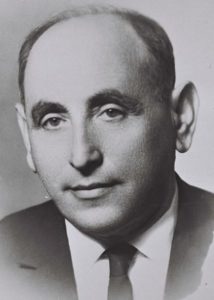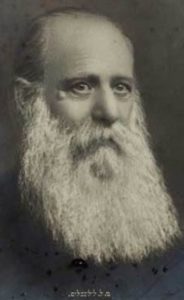Father of Israeli Intelligence
 Israel “Isser” Halperin (1912-2003) was born in what is today Vitebsk, Belarus to a wealthy Jewish-Russian family. His father was a rabbi who had studied at the famed Volozhin Yeshiva, while his mother’s family ran a large vinegar factory. Following the Russian Revolution, they lost their business and the Communists confiscated all of their property. The family eventually fled to Latvia and were robbed along the way, arriving with absolutely nothing. Young Isser realized Jews would never be safe anywhere, and needed their own national home. He soon joined a Zionist youth group, and at 16 decided to make aliyah. The following year, he faked his age to get a British visa. Arriving in Israel, he joined a kibbutz and there met his soon-to-be wife. The couple later opened their own orange-packing company. In 1942, Isser changed his last name to the Hebrew Harel (“Mountain of God”), and joined the pre-IDF Haganah, which was working together with the British auxiliary forces to fight the Nazis. Harel took an officer’s course in intelligence, then joined the Haganah’s “Shai” intelligence unit. He eventually became the main aid to Shai’s chief, as well as the head of its Tel-Aviv office. With the birth of the State of Israel in 1948, Harel co-founded Shin Bet, Israel’s “FBI”, and built it from the ground up. In 1952, he became the director of Mossad, and over the next 11 years at its helm, turned it into one of the world’s most elite intelligence agencies. In 1955, he arranged meetings between Egypt’s Nasser and Ben-Gurion and nearly achieved a peace deal. Meanwhile, he convinced Morocco’s king to let 80,000 Moroccan Jews immigrate to Israel. It was Harel who obtained copies of Soviet leader Nikita Khrushchev’s critical 1956 “Secret Speech” denouncing his predecessor Stalin and marking an important shift in the USSR. He shared the speech with the CIA. Harel also exposed a number of Soviet agents. In 1960, Harel planned and led the successful mission to capture Nazi war criminal Adolf Eichmann. He later wrote an account of the mission, The House on Garibaldi Street, which became a bestseller and was adapted to a 1979 film of the same name. In 1963, Harel oversaw Operation Damocles which targeted German rocket scientists working for Egypt. When Mossad mail bombs killed innocent bystanders, Harel resigned from his position. He later joined Ben-Gurion’s new political party and was elected to the Knesset in 1969, serving until 1973. After retiring, he turned to writing and published ten popular books, both fiction and non-fiction. It has been said that “No one terrified Israel’s enemies like Isser Harel”.
Israel “Isser” Halperin (1912-2003) was born in what is today Vitebsk, Belarus to a wealthy Jewish-Russian family. His father was a rabbi who had studied at the famed Volozhin Yeshiva, while his mother’s family ran a large vinegar factory. Following the Russian Revolution, they lost their business and the Communists confiscated all of their property. The family eventually fled to Latvia and were robbed along the way, arriving with absolutely nothing. Young Isser realized Jews would never be safe anywhere, and needed their own national home. He soon joined a Zionist youth group, and at 16 decided to make aliyah. The following year, he faked his age to get a British visa. Arriving in Israel, he joined a kibbutz and there met his soon-to-be wife. The couple later opened their own orange-packing company. In 1942, Isser changed his last name to the Hebrew Harel (“Mountain of God”), and joined the pre-IDF Haganah, which was working together with the British auxiliary forces to fight the Nazis. Harel took an officer’s course in intelligence, then joined the Haganah’s “Shai” intelligence unit. He eventually became the main aid to Shai’s chief, as well as the head of its Tel-Aviv office. With the birth of the State of Israel in 1948, Harel co-founded Shin Bet, Israel’s “FBI”, and built it from the ground up. In 1952, he became the director of Mossad, and over the next 11 years at its helm, turned it into one of the world’s most elite intelligence agencies. In 1955, he arranged meetings between Egypt’s Nasser and Ben-Gurion and nearly achieved a peace deal. Meanwhile, he convinced Morocco’s king to let 80,000 Moroccan Jews immigrate to Israel. It was Harel who obtained copies of Soviet leader Nikita Khrushchev’s critical 1956 “Secret Speech” denouncing his predecessor Stalin and marking an important shift in the USSR. He shared the speech with the CIA. Harel also exposed a number of Soviet agents. In 1960, Harel planned and led the successful mission to capture Nazi war criminal Adolf Eichmann. He later wrote an account of the mission, The House on Garibaldi Street, which became a bestseller and was adapted to a 1979 film of the same name. In 1963, Harel oversaw Operation Damocles which targeted German rocket scientists working for Egypt. When Mossad mail bombs killed innocent bystanders, Harel resigned from his position. He later joined Ben-Gurion’s new political party and was elected to the Knesset in 1969, serving until 1973. After retiring, he turned to writing and published ten popular books, both fiction and non-fiction. It has been said that “No one terrified Israel’s enemies like Isser Harel”.
Important Thoughts on Palestinian Refugees
Words of the Week
The best way to understand antisemitism is to see it as a virus. Viruses attack the human body, but the body itself has an immensely sophisticated defence, the human immune system. How, then, do viruses survive and flourish? By mutating. Antisemitism mutates, and in so doing defeats the immune systems set up by cultures to protect themselves against hatred. There have been three such mutations in the past two thousand years, and we are living through the fourth.
– Rabbi Lord Jonathan Sacks



